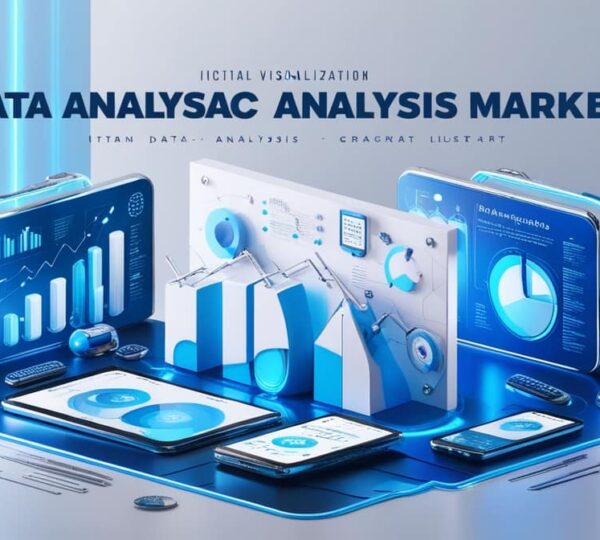Data Analysis Market: Trends and Tools to Drive Business Success

Data Analysis Market: Trends and Tools to Drive Business Success
Data analysis market: Explore the latest trends, tools, and insights shaping the future 
In today’s highly competitive market, data-driven decisions have become essential for the success of any business. Whether you’re in social media marketing, digital marketing, or conducting market research, understanding how to analyze and interpret data effectively is crucial. This guide will walk you through the significance of data analysis in social media marketing, digital marketing, and marketing research, exploring how these areas intersect and how businesses can benefit from a robust data analysis strategy.

Social Media Marketing Data Analysis
Social media platforms have revolutionized the way businesses interact with customers. With billions of active users on platforms like Facebook, Instagram, Twitter, and LinkedIn, companies have a wealth of data at their fingertips. Social media marketing data analysis is the process of collecting, analyzing, and interpreting data from these platforms to measure campaign performance, understand audience behavior, and refine marketing strategies. Types of analysis of data in research include qualitative, quantitative, and mixed methods, each offering unique insights to support findings.
Data analysis in social media marketing allows businesses to:
- Measure Campaign Effectiveness: By analyzing key performance indicators (KPIs) such as engagement rates, click-through rates, and conversions, companies can assess the success of their campaigns and adjust strategies as needed.
- Understand Audience Preferences: Social media platforms provide detailed insights into the demographics, interests, and behaviors of your audience. This helps businesses create targeted content and ads.
- Improve Customer Engagement: Analyzing social media interactions (comments, shares, likes) allows brands to understand customer sentiments and improve their engagement strategies.
- Track Competitor Performance: Data analysis can also help companies track competitors’ social media performance, providing insights into industry trends and potential opportunities.
At Rapid Phone Center, we specialize in data analysis digital marketing, providing businesses with valuable insights to improve their online presence. By leveraging advanced analytics, we assess campaign performance, track key metrics, and optimize strategies. Our data-driven approach helps companies enhance customer engagement, boost ROI, and achieve marketing success in the digital world. Explore effective Qualitative Data Analysis Techniques to gain deeper insights and enhance your research findings with expert methods and tools.

Data Analysis for Marketing Research: Techniques, Tools, and Best Practices for Effective Decision Making
To perform effective data analysis in social media marketing, follow these steps:
- Gather Data: Use social media analytics tools to collect data such as impressions, reach, engagement, and demographic details of followers.
- Define KPIs: Establish clear objectives for your campaign, whether it’s increasing brand awareness, driving website traffic, or generating leads.
- Analyze the Data: Look for patterns, trends, and correlations in the data to understand what works and what doesn’t.
- Make Adjustments: Based on your findings, optimize your social media content and advertising strategy to improve performance.
Rapid Phone Center excels in data analysis of digital marketing, offering insights that optimize online campaigns. By analyzing key metrics, we help businesses measure performance, identify trends, and improve customer engagement. Our data-driven approach empowers companies to enhance their digital strategies, maximize ROI, and stay ahead in the competitive digital landscape. Master Statistical Data Analysis Techniques to uncover trends, make informed decisions, and enhance the accuracy of your research results.
Digital Marketing Data Analysis
Data analysis plays a critical role in digital marketing. From SEO and email marketing to paid search and display advertising, every aspect of digital marketing generates valuable data that can be analyzed for actionable insights.

Digital marketing data analysis provides businesses with several advantages, including:
- Optimization of Campaigns: Data analysis helps refine campaigns by identifying underperforming channels and allocating resources more effectively.
- Enhanced Customer Insights: By analyzing user behavior across digital channels (website visits, clicks, social media interactions), businesses can personalize marketing efforts and improve customer experiences.
- Improved ROI: Data analysis for digital marketing allows companies to track the return on investment (ROI) for each marketing channel, ensuring that resources are spent efficiently.
- Real-time Insights: Digital marketing platforms often provide real-time data, enabling businesses to make quick adjustments to campaigns and maximize results.
Rapid Phone Center offers comprehensive market analysis data, providing businesses with actionable insights to understand market trends and consumer behavior. Our data-driven approach helps companies make informed decisions, identify growth opportunities, and refine strategies. With accurate and reliable market analysis, we empower businesses to stay competitive and succeed in a dynamic marketplace. Enhance customer satisfaction with Omnichannel Customer Service, providing seamless support across multiple platforms for a consistent experience.
Analysis of Data in Marketing Research: Insights, Techniques, and Strategies for Optimizing Business Decisions
- Website Analytics: Tools like Google Analytics provide detailed insights into website traffic, conversion rates, and user behavior, allowing companies to optimize landing pages and improve user experience.
- Email Marketing: Analyzing open rates, click rates, and conversions helps marketers refine email content and segmentation strategies.
- Paid Advertising: Digital ads can be tracked and analyzed to determine which keywords, ad copy, and targeting options lead to the best performance.

How to Conduct Data Analysis in Digital Marketing
- Identify Goals: Set clear, measurable goals for each digital marketing channel.
- Gather Data: Use analytics tools to collect data on website traffic, social media activity, email campaigns, and paid ads.
- Analyze Performance: Use metrics like conversion rates, bounce rates, and cost per acquisition (CPA) to evaluate the success of your campaigns.
- Optimize: Based on your findings, adjust your strategies to focus on high-performing channels and tactics.
Rapid Phone Center specializes in data analysis marketing research, providing insights that drive strategic decisions. By leveraging advanced data analytics techniques, we help businesses understand customer behavior, optimize marketing strategies, and enhance campaign performance. Our expertise ensures actionable, data-driven results for effective market positioning. Streamline operations with efficient Back Office Services, supporting core functions like data management, customer support, and administrative tasks.
Digital Marketing and Data Analysis: Leveraging Data to Drive Strategy, Optimize Campaigns, and Maximize ROI
Market data analysis involves examining data related to market trends, customer behavior, competitor activity, and overall industry performance. It is a vital process for businesses looking to stay ahead of the competition, identify new opportunities, and make informed decisions.
Why is Market Data Analysis Important?
Data analysis market trends provide businesses with insights into:

- Market Opportunities: By analyzing data related to consumer preferences, emerging technologies, and industry shifts, companies can identify untapped markets and growth opportunities.
- Consumer Behavior: Understanding what drives consumer purchasing decisions allows companies to tailor their products, services, and marketing efforts accordingly.
- Competitive Analysis: By examining market data, businesses can monitor competitor strategies and adjust their own tactics to remain competitive.
- Forecasting: Market data analysis helps companies predict future trends, enabling them to plan and make proactive decisions.
Key Elements of Market Data Analysis
- Customer Demographics: Analyzing data related to age, gender, income level, and geographic location helps businesses understand their target audience.
- Market Size and Growth: Data on market size and growth rates help businesses evaluate the potential for expansion and identify key growth segments.
- Competitive Landscape: Tracking competitor performance and market share helps businesses benchmark their own success and identify areas for improvement. Boost efficiency and customer satisfaction with AI Customer Service, delivering fast, automated support for a seamless user experience.
How to Conduct Market Data Analysis
- Define Research Objectives: Establish clear objectives for your market analysis, such as identifying growth opportunities or understanding customer behavior.
- Collect Data: Use surveys, customer feedback, social media data, and industry reports to gather relevant market information.
- Analyze Trends: Look for patterns in the data, such as shifts in consumer preferences or emerging trends in the industry.
- Make Data-Driven Decisions: Use the insights gained from market analysis to adjust your business strategy and make informed decisions.

Marketing Research Data Analysis
Marketing research data analysis is the process of evaluating data collected during marketing research efforts to identify trends, measure consumer satisfaction, and assess the effectiveness of marketing strategies.
- Informed Decision-Making: Data analysis in marketing research ensures that business decisions are based on real insights rather than assumptions.
- Identifying Customer Needs: By analyzing customer feedback and survey data, businesses can gain a deeper understanding of consumer needs and preferences.
- Assessing Brand Health: Marketing research data helps businesses gauge their brand’s performance in the market and identify areas for improvement.
- Tracking Marketing Effectiveness: Marketing research allows businesses to evaluate the impact of marketing campaigns and initiatives.
Types of Marketing Research Data Analysis
- Quantitative Analysis: Analyzing numerical data such as sales figures, survey responses, and website traffic to identify trends and patterns.
- Qualitative Analysis: Analyzing non-numerical data such as customer reviews, focus group feedback, and social media comments to gain insights into customer perceptions and attitudes.

How to Conduct Data Analysis in Marketing Research
- Define the Research Problem: Clearly identify the problem or question you are trying to answer with your marketing research.
- Collect Data: Use surveys, interviews, focus groups, and other methods to gather data relevant to your research.
- Analyze the Data: Use statistical tools to identify trends and relationships within the data.
- Draw Conclusions: Use the analysis to make informed decisions about your marketing strategies and tactics.
Data analysis plays a central role in various aspects of modern marketing, from social media marketing and digital marketing to market research and consumer behavior analysis. By harnessing the power of data, businesses can make more informed decisions, optimize their marketing strategies, and stay ahead of the competition. Whether you’re looking to measure the effectiveness of a social media campaign, optimize a digital marketing strategy, or conduct in-depth market research, data analysis is the key to unlocking valuable insights that drive business growth.
For businesses looking to stay competitive and grow in today’s data-driven world, integrating comprehensive data analysis into their marketing efforts is not just an option—it’s a necessity.
Frequently Asked Questions
Explore the Frequently Asked Questions for Data Analysis Market to understand key trends, tools, and techniques driving data analysis today.
What is data analysis?
Data analysis involves inspecting, cleaning, transforming, and modeling data to discover useful information, draw conclusions, and support decision-making. It is a key process in data science and analytics.

Why is data analysis important for businesses?
Data analysis helps businesses uncover trends, patterns, and insights from large datasets, which can be used to optimize operations, improve customer experiences, and make informed decisions.
What are the tools used for data analysis?
Popular tools for data analysis include Microsoft Excel, Google Analytics, Tableau, R, Python, Power BI, SAS, and SQL, among others.
What is the difference between data analysis and data analytics?
Data analysis is the process of examining raw data to extract meaningful insights, while data analytics involves applying techniques and technologies to extract, clean, and process data, often at a larger scale.
You might also find our article intriguing:
- What Are the Types of Data Analysis
- Types of Analysis for Qualitative Data
- Types of Data Analysis in Quantitative Research
Good Luck to You





